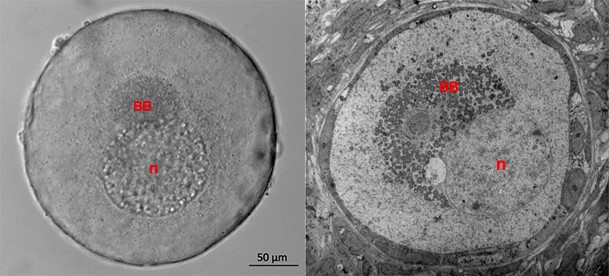 Oocyte Biology & Cellular Dormancy
Oocyte Biology & Cellular Dormancy

2004-2008 Undergraduate Student (BSc) at Middle East Technical University, Ankara, Turkey (Valedictorian)
2008-2012 Graduate Student at Cancer Research UK Manchester Institute (CRUK-MI), Manchester, UK.
2013-2016 Postdoctoral Fellow at the Department of Systems Biology, Harvard Medical School, Boston, USA.
2017- Group Leader in the Cell & Developmental Biology programme at the Centre for Genomic Regulation, Barcelona, Spain.
Group News
Dr. Elvan Böke recognised by EMBO and Fundación Banco Sabadell (03/07/2024)
Known for her research on female fertility and oocyte biology, Dr. Elvan Böke at the Centre for Genomic Regulation (CRG) has recently been honoured with two prestigious awards: the EMBO Gold Medal 2024 and the 19th Prize for Biomedical Research from the Fundación Banco Sabadell.
How Oocytes Outsmart Toxic Proteins to Preserve Long-term Female Fertility (20/02/2024)
Researchers at the Centre for Genomic Regulation (CRG) in Barcelona have discovered a new mechanism which explains how oocytes remain in pristine conditions for decades without succumbing to the wear and tear that would cause other cell types to fail.
When do Oocytes Begin to Experience the Effects of Age? (04/10/2023)
Dr. Elvan Böke, Group Leader at the Centre for Genomic Regulation in Barcelona, will explore this question thanks to a new project funded by the Global Consortium for Reproductive Longevity & Equality (GCRLE).
Elvan Böke honoured with the 2023 Vallee Scholar Award (08/09/2023)
Elvan Böke, researcher at the Centre for Genomic Regulation in Barcelona, has been awarded a prestigious Vallee Scholar Award thanks to the support of the Barcelona Institute of Science & Technology (BIST).
Elvan receives two major awards from the US - GCRLE Award to study reproductive longevity and a prestigious Vallee Scholar Award!
Elvan receives the Sabri Ulker Science Award (May 2023)
Elvan and Aida are finalists in this year's La Vanguardia Science Award! (February 2023)
Elvan receives the Barcelona City Prize (Premi Ciutat de Barcelona 2022). Congratulations! (16/02/2023)
Two Consecutive ERC Grants!! Research exploring how human egg cells remain healthy for decades backed by ERC (31/01/2023)
The group will combine experiments involving biochemical perturbations with imaging and the state-of-the-art -omics techniques to reveal both the mechanisms dormant oocytes employ to maintain cellular fitness and how ageing affects these mechanisms.
Human eggs remain healthy for decades by putting ‘batteries on standby mode’ (20/07/2022)
Immature human egg cells skip a fundamental metabolic reaction thought to be essential for generating energy, according to the findings of a study by researchers at the CRG published in Nature.
Elvan Böke joins EMBO Young Investigator Network (09/12/2021)
Elvan has been selected to the European Molecular Biology Organization’s (EMBO) prestigious young investigator programme.
The Böke lab awarded an ERC Starting Grant 2017 to study dormant oocytes. Congrats! (06/09/2017)
Job Openings
If you are enthusiastic to discover the strategies that enable a cell to evade ageing for decades, join us! Write an email to Elvan to discuss possibilities.
Summary
Our lab focuses on one of the biggest problems developed nations are facing in 21st century: Late-stage motherhood, and associated fertility problems. The decrease in fertility rates is leading to a population decline in majority of the developed nations from Japan to Spain, which will have unprecedented consequences for our societies in near future.
Poor oocyte quality accounts for the majority of female fertility problems, however, we know little about how oocytes can remain healthy for many years or why their health eventually declines with advanced age. World-wide data show that more than 25% of female fertility problems are unexplained, pointing to a huge gap in our understanding of female reproduction. Our lab strives to help fill this gap by studying immature oocytes.
We’re interested in three main lines of research:
1 - How do oocytes maintain proteostasis?
A remarkable feature of reproduction is that the offspring does not inherit the ageing status of their parents. In mammals, the embryo inherits the cytoplasm from the mother, in the form of the oocyte cytoplasm. This suggests the existence of mechanisms to counteract the accumulation of intracellular damage in the oocytes. We are studying these mechanisms to reveal how oocytes establish and maintain proteostasis.
2 - What is the metabolic state of mitochondria in oocytes?
Mitochondria in oocytes are the sole source of mitochondria for the new embryo, and thus, their quality is extremely important for proper development. We are working with human and frog (Xenopus leavis) oocytes to understand the metabolic nature of mitochondria in oocytes.
The majority of mitochondria in human and frog early oocytes lie in the Balbiani body, which can be thought of as a “superorganelle” that clusters other organelles. The Balbiani body is stable only in the dormant oocytes, and disperses upon oocyte activation. Our previous research has shown that the Balbiani body forms an amyloid-like cage around organelles that could be protective. We investigate the function of the Balbiani body, as well as features of mitochondria inside and outside of this superorganelle.

Balbiani bodies, labeled “BB” in these images of an immature frog egg (left) and immature human egg (right, larger scale), hold organelles together in one spot next to the nucleus, “n,” in the months or years before an egg matures. Images: Elvan Boke (left), Arthur Hertig (right)
3- Are primordial oocytes susceptible to aging?
Oocyte quality declines with increasing maternal age, but we do not know whether age-related defects are already present in primordial oocytes or are acquired during oocyte maturation. Indeed, it is unknown to which extent oocyte aging is caused by cell-intrinsic mechanisms or by the aging microenvironment (cell-extrinsic). Answers to these questions might allow us to develop therapeutic strategies that delay or even prevent oocyte decline with age.
We use oocytes from two vertebrate species, frogs and mice, which are complementary for their ease of handling and relationship to human physiology. We also collaborate with Hospital Clinic Barcelona and Clinica Eugin to obtain human immature oocytes.
Funding Acknowledgements

The project “Molecular mechanisms through which oocytes evade ageing” has received funding from the European Union's Horizon Europe under the grant agreement No ACTIVEDORMANCY_ 101088824 (01/01/2024-31/12/2028)

PID2020-115127GB-I00 funded by MCIN/AEI/ 10.13039/501100011033
